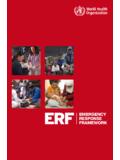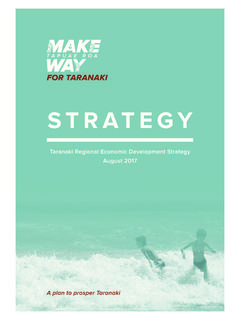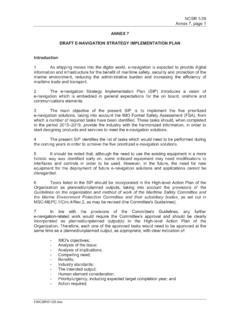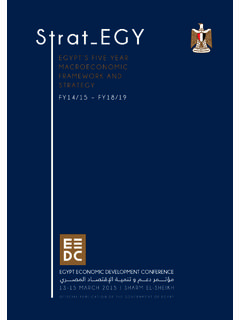Transcription of Comprehensive Disaster Management Strategy
1 Regional Comprehensive Disaster Management (CDM). Strategy and Programming Framework 2014-2024. (DRAFT). i A publication of the Caribbean Disaster Emergency Management Agency, Building No. 1, Manor Lodge Complex. Lodge Hill, St. Michael, Barbados. Tel: 1 (246) 435 0386. Fax: 1 (246) 425 8854. This document may be reproduced and/or adopted in whole or in part providing that there is acknowledgement of CDEMA and no material change in the content, the procedures advocated or the policy recommended. Anyone wishing to reproduce or adopt should notify CDEMA in writing. ISBN: 978-976-8243-21-8. An e-book version of this book is also available on the CDEMA website. ISBN 978-976-8243-22-5. Printed in Barbados. 2014. ii Acknowledgements The Caribbean Disaster Emergency Management Agency (CDEMA) is grateful to the consulting team of Sage Consulting - Joseph Smith Abbott, Donovan Gentles and Marlene Smith-Barrett - who led the process in elaborating the CDM Strategy 2014-2024.
2 The elaboration of the ten year CDM Strategy required extensive input and collaboration from the following development, regional and national partners who participated and gave freely of their expertise and knowledge - National Disaster Coordinators, members of the CDM Expert Panel, the CDM Coordination and Harmonization Council, the Gender Working Group, the established Sector Sub-Committees (Health, Tourism, Education, Agriculture, Civil Society) and the emerging sector sub- committees (Finance and Economic Development and Physical and Environmental Planning). Members from these stakeholder groupings participated in an initial stakeholder consultative meeting, which took place in June 2013 in Barbados where the revised Logic Model was considered and refined. The meeting representatives were from the following agencies: NODS (Antigua and Barbuda), DDM. (Anguilla), DEM (Barbados), NEMA (The Bahamas), ODM (Commonwealth of Dominica), NaDMA.
3 (Grenada), CDC (Guyana), NEMO (St. Vincent and the Grenadines), NEMA (Saint Kitts and Nevis), DDME. (Turks and Caicos Islands), DDM (Virgin Islands), CCCCC, DRRC-UWI, UWI (ICSAC Barbados), CCEO, DFATD, CPDC, DFID Caribbean, Delegation of the European Union to Barbados & OECS, IFRC, PAHO, UNDP CRMI, UNDP DRR, UNISDR, Kitch Consulting, and CDEMA. A subsequent meeting took place in October 2013 in Barbados where the Logic Model was further refined and the Performance Monitoring Framework was considered and reviewed. Representatives from the National Disaster Coordination Offices included NODS (Antigua and Barbuda), DEM (Barbados), ODM (Dominica), NaDMA (Grenada), CDC (Guyana), CPD (Haiti), ODPEM (Jamaica), DMCA (Montserrat), NEMA (St. Kitts and Nevis), NEMO (St. Vincent and the Grenadines), ODPM (Trinidad and Tobago), DDME (Turks and Caicos Islands) and DDM (Virgin Islands).
4 The Private and Finance Sectors included CDB, Caribbean Risk Managers Ltd/ CCRIF, and CCCU. The Physical Planning and Economic Development Sector included CCEO. Members of the Education Sector Sub-Committee included DRRC-UWI, University of Guyana, UTECH, UNICEF and CAS. Members of the Civil Sector Sub-Committee included CPDC, IFRC - Caribbean Regional Representation Office, ADRA Caribbean, HelpAge International and CANARI. The Health Sector Sub-Committee included Ministry of Health Jamaica and Ministry of Health Saint Lucia. The Agriculture Sector Sub-Committee included CABA, CAFAN, CCCCC, IICA and CFNO. The Tourism Sector Sub-Committee included Ministry of Tourism - The Bahamas. Members of the CHC included DFATD, DFID Caribbean, Delegation of the European Union to Barbados & OECS, UNDP and OECS. Members of the CDEMA CU included Ronald Jackson (Executive Director), Elizabeth Riley (Deputy Executive Director), Andria Grosvenor (Alliance & Cooperation Services Manager), Dr.
5 Elvis Nurse (Director Resource Management & Administration Division), Oronde Lambert (ICT Manager), Donna Walker (HR Manager), Joanne Persad (Programme Manager-Response and Recovery), Robert Harewood (Programme Manager-Response and Recovery), Donna Pierre (Mitigation and Preparedness Specialist . Roving Technical Support Team), Claudine Roberts (Community Disaster Planning Specialist Roving Technical Support Team), Atiba Morris (ICT Support Specialist), Patricia Maughan (Project Coordinator . RPG2), Stacy Harris (Conference Coordinator), Cisne Pascal (Programme Coordinator CDM HIP), Ricardo Yearwood (Programme Officer CDM HIP), Gayle Drakes (Programme Officer CDM HIP), Saudia Rahat (Senior Programme Officer CDM HIP) and Michelle Harris (Secretary CDM HIP). iii CDEMA also expresses its appreciation to the Department for International Development (UK Aid), the Canadian International Development Agency (CIDA) and the Australian Agency for International Development (AusAID) for the financial support provided for the process and publication of the report through the Comprehensive Disaster Management Harmonised Implementation Programme (CDM HIP), Phase 1.
6 Above all, this plan is drafted with the paramount concern and unflinching desire that it should make a difference in the lives of Caribbean people; that through the collective efforts of national, regional and international partners, who have decided to harmonise plans and pool their resources that lives, livelihoods and property will be saved from the ravages of disasters and hazard events, which impact our region and do not discriminate in their outcome by class, gender, political status or age. iv Acronyms ADRA Adventist Development and Relief Agency AusAID Australian Agency for International Development CABA Caribbean Agribusiness Association CAFAN Caribbean Farmers Network CANARI Caribbean Natural Resources Institute CARICOM Caribbean Community CAS Caribbean Academy of Sciences CBDM Community-Based Disaster Management CCA Climate Change Adaptation CCCCC Caribbean Community Climate Change Centre CCEO Council of Caribbean Engineering Organizations CDB Caribbean Development Bank CDEMA Caribbean Disaster and Emergency Management Agency CDEMA CHC Caribbean Disaster and Emergency Management Agency Council on Harmonisation and Coordination CDEMA CU Caribbean Disaster and Emergency Management Agency Coordinating Unit CC Climate Change CCA Climate Change Adaptation CCCU Caribbean Confederation of Credit Unions CCRIF Caribbean Catastrophe Risk Insurance Facility CDC
7 Civil Defense Commission CDERA Caribbean Disaster and Emergency Response Agency CDM Comprehensive Disaster Management CIDA Canadian International Development Agency CNFO Caribbean Network of Fisher Folk Organizations COE Centres of Excellence CPD Civil Protection Directorate CPDC Caribbean Policy Development Centre CSME Caribbean Single Market and Economy CWP Country Work Programme DDM Department of Disaster Management DDME Department of Disaster Management and Emergencies DEM Department of Emergency Management DFATD Department of Foreign Affairs, Trade and Development DFID Department for International Development DM Disaster Management DMCA Disaster Management Coordination Agency DRM Disaster Risk Management DRR Disaster Risk Reduction DRRC Disaster Risk Reduction Centre EWS Early Warning Systems HFA Hyogo Framework for Action HVA Hazard and Vulnerability Assessment ICT Information, Communications and Technology IFRC International Federation of Red Cross IICA Inter-American Institute for Cooperation on Agriculture IPCC Inter-governmental Panel on Climate Change IUCN International Union for Conservation of Nature MDG Millennium Development Goals MER Monitoring.
8 Evaluation and Reporting NaDMA National Disaster Management Agency v NDO National Disaster Organisation NEMA National Emergency Management Agency NEMO National Emergency Management Office NEOC National Emergency Operations Centre NODS National Office of Disaster Services ODM Office of Disaster Management OECD DAC Organisation for Economic Co-operation and Development Development Assistance Committee OECS Organisation of Eastern Caribbean States ODPM Office for Disaster Preparedness and Management ODPEM Office of Disaster Preparedness and Emergency Management PBA Programme Based Approach PMF Performance Monitoring Framework POA Programme of Action PS Participating State RBM Results Based Management SSC Sector Sub-Committee UNDP United Nations Development Programme UNFCCC United Nations Framework Convention on Climate Change UNICEF United Nations Children's Fund UNISDR United Nations International Strategy for Disaster Reduction USAID United States Agency for International Development UTECH University of Technology vi Definitions/Glossary Building code A set of ordinances or regulations and associated standards intended to control aspects of the design, construction, materials, alteration and occupancy of structures that are necessary to ensure human safety and welfare, including resistance to collapse and damage.
9 Comment: Building codes can include both technical and functional standards. They should incorporate the lessons of international experience and should be tailored to national and local circumstances. A systematic regime of enforcement is a critical supporting requirement for effective implementation of building codes (UNISDR, 2009). Capacity The combination of all the strengths, attributes and resources available within a community, society or organization that can be used to achieve agreed goals. Comment: Capacity may include infrastructure and physical means, institutions, societal coping abilities, as well as human knowledge, skills and collective attributes such as social relationships, leadership and Management . Capacity also may be described as capability. Capacity assessment is a term for the process by which the capacity of a group is reviewed against desired goals, and the capacity gaps are identified for further action (UNISDR, 2009).
10 Capacity The process by which people, organizations and society systematically stimulate and Development develop their capacities over time to achieve social and economic goals, including through improvement of knowledge, skills, systems, and institutions. Comment: Capacity development is a concept that extends the term of capacity building to encompass all aspects of creating and sustaining capacity growth over time. It involves learning and various types of training, but also continuous efforts to develop institutions, political awareness, financial resources, technology systems, and the wider social and cultural enabling environment (UNISDR, 2009). Climate change (a) The Inter-governmental Panel on Climate Change (IPCC) defines climate change as: a change in the state of the climate that can be identified ( , by using statistical tests) by changes in the mean and/or the variability of its properties, and that persists for an extended period, typically decades or longer.





